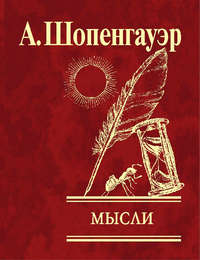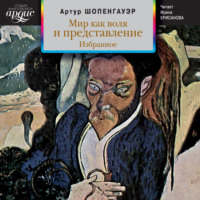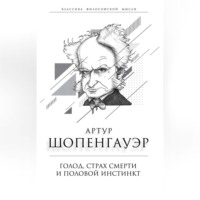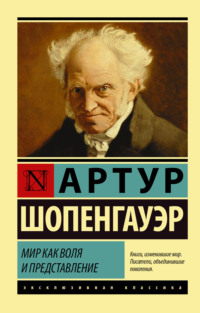 полная версия
полная версияThe World as Will and Idea (Vol. 3 of 3)
Before I close this chapter I wish to adduce a few proofs in support of what in § 68 of the first volume I denoted by the expression Δευτυρος πλους, the bringing about of the denial of the will by one's own deeply felt suffering, thus not merely by the appropriation of the suffering of others, and the knowledge of the vanity and wretchedness of our existence introduced by this. We can arrive at a comprehension of what goes on in the heart of a man, in the case of an elevation of this kind and the accompanying purifying process, by considering what every emotional man experiences on beholding a tragedy, which is of kindred nature to this. In the third and fourth acts perhaps such a man is distressed and disturbed by the ever more clouded and threatened happiness of the hero; but when, in the fifth act, this happiness is entirely wrecked and shattered, he experiences a certain elevation of the soul, which affords him an infinitely higher kind of pleasure than the sight of the happiness of the hero, however great it might be, could ever have given. Now this is the same thing, in the weak water-colours of sympathy which is able to raise a well-known illusion, as that which takes place with the energy of reality in the feeling of our own fate when it is heavy misfortune that drives the man at last into the haven of entire resignation. Upon this occurrence depend all those conversions which completely transform men such as are described in the text. I may give here in a few words the story of the conversion of the Abbé Rancé, as it is strikingly similar to that of Raymond Lully, which is told in the text, and besides this is memorable on account of its result. His youth was devoted to enjoyment and pleasure; finally, he lived in a relation of passion with a Madame de Montbazon. One evening, when he visited her, he found her room empty, in disorder and darkness. He struck something with his foot; it was her head, which had been severed from the trunk, because after her sudden death her corpse could not otherwise be got into the lead coffin that stood beside it. After overcoming an immense sorrow, Rancé now became, in 1663, the reformer of the order of the Trappists, which at that time had entirely relaxed the strictness of its rules. He joined this order, and through him it was led back to that terrible degree of renunciation which is still maintained at the present day at La Trappe, and, as the methodically carried out denial of the will, aided by the severest renunciation and an incredibly hard and painful manner of life, fills the visitor with sacred awe, after he has been touched at his reception by the humility of these genuine monks, who, emaciated by fasting, by cold, by night watches, prayers and penances, kneel before him, the worldling and the sinner, to implore his blessing. Of all orders of monks, this one alone has maintained itself in perfection in France, through all changes; which is to be attributed to the profound earnestness which in it is unmistakable, and excludes all secondary ends. It has remained untouched even by the decline of religion, because its root lies deeper in human nature than any positive system of belief.
I have mentioned in the text that this great and rapid change of the inmost being of man which we are here considering, and which has hitherto been entirely neglected by philosophers, appears most frequently when, with full consciousness, he stands in the presence of a violent and certain death, thus in the case of executions. But, in order to bring this process much more distinctly before our eyes, I regard it as by no means unbecoming to the dignity of philosophy to quote what has been said by some criminals before their execution, even at the risk of incurring the sneer that I encourage gallows' sermons. I certainly rather believe that the gallows is a place of quite peculiar revelations, and a watch-tower from which the man who even then retains his presence of mind obtains a wider, clearer outlook into eternity than most philosophers over the paragraphs of their rational psychology and theology. The following speech on the gallows was made on the 15th April, 1837, at Gloucester, by a man called Bartlett, who had murdered his mother-in-law: “Englishmen and fellow countrymen, – I have a few words to say to you, and they shall be but very few. Yet let me entreat you, one and all, that these few words that I shall utter may strike deep into your hearts. Bear them in your mind, not only now while you are witnessing this sad scene, but take them to your homes, take them, and repeat them to your children and friends. I implore you as a dying man – one for whom the instrument of death is even now prepared – and these words are that you may loose yourselves from the love of this dying world and its vain pleasures. Think less of it and more of your God. Do this: repent, repent, for be assured that without deep and true repentance, without turning to your heavenly Father, you will never attain, nor can hold the slightest hope of ever reaching those bowers of bliss to which I trust I am now fast advancing” (Times, 18th April 1837).
Still more remarkable are the last words of the well-known murderer, Greenacre, who was executed in London on the 1st of May 1837. The English newspaper the Post gives the following account, which is also reprinted in Galignani's Messenger of the 6th of May 1837: “On the morning of his execution a gentleman advised him to put his trust in God, and pray for forgiveness through the mediation of Jesus Christ. Greenacre replied that forgiveness through the mediation of Christ was a matter of opinion; for his part, he believed that in the sight of the highest Being, a Mohammedan was as good as a Christian and had just as much claim to salvation. Since his imprisonment he had had his attention directed to theological subjects, and he had become convinced that the gallows is a passport to heaven.” The indifference displayed here towards positive religions is just what gives this utterance greater weight, for it shows that it is no fanatical delusion, but individual immediate knowledge that lies at its foundation. The following incident may also be mentioned which is given by Galignani's Messenger of the 15th August 1837, from the Limerick Chronicle: “Last Monday Maria Cooney was executed for the revolting murder of Mrs. Anderson. So deeply was this wretched woman impressed with the greatness of her crime that she kissed the rope which was put round her neck, while she humbly implored the mercy of God.” Lastly this: the Times, of the 29th April 1845 gives several letters which Hocker, who was condemned for the murder of Delarue, wrote the day before his execution. In one of these he says: “I am persuaded that unless the natural heart be broken, and renewed by divine mercy, however noble and amiable it may be deemed by the world, it can never think of eternity without inwardly shuddering.” These are the outlooks into eternity referred to above which are obtained from that watch-tower; and I have had the less hesitation in giving them here since Shakspeare also says —
“Out of these convertites
There is much matter to be heard and learned.”
– As You Like it, last scene.Strauss, in his “Life of Jesus,” has proved that Christianity also ascribes to suffering as such the purifying and sanctifying power here set forth (Leben Jesu, vol. i. ch. 6, §§ 72 and 74). He says that the beatitudes in the Sermon on the Mount have a different sense in Luke (vi. 21) from that which they have in Matt. (v. 3), for only the latter adds τῳ πνευματι to μακαριοι οἱ πτωχοι, and την δικαιοσυνην to πεινωντες. Thus by him alone are the simple-minded, the humble, &c., meant, while by Luke are meant the literally poor; so that here the contrast is that between present suffering and future happiness. With the Ebionites it is a capital principle that whoever takes his portion in this age gets nothing in the future, and conversely. Accordingly in Luke the blessings are followed by as many ουαι, woes, which are addressed to the rich, οἱ πλουσιοι, the full, οἱ εμπεπλησμενοι, and to them that laugh, οἱ γελωντες, in the Ebionite spirit. In the same spirit, he says, p. 604, is the parable (Luke xvi. 19) of the rich man and Lazarus given, which nowhere mentions any fault of the former or any merit of the latter, and takes as the standard of the future recompense, not the good done or the wickedness practised, but the evil suffered here and the good things enjoyed, in the Ebionite spirit. “A like estimation of outward poverty,” Strauss goes on, “is also attributed to Jesus by the other synoptists (Matt. xix. 16; Mark x. 17; Luke xviii. 18), in the story of the rich young man and the saying about the camel and the eye of a needle.”
If we go to the bottom of the matter we will recognise that even in the most famous passages of the Sermon on the Mount there is contained an indirect injunction to voluntary poverty, and thereby to the denial of the will to live. For the precept (Matt. v. 40 seq.) to consent unconditionally to all demands made upon us, to give our cloak also to him who will take away our coat, &c., similarly (Matt. vi. 25-34) the precept to cast aside all care for the future, even for the morrow, and so to live simply in the present, are rules of life the observance of which inevitably leads to absolute poverty, and which therefore just say in an indirect manner what Buddha directly commands his disciples and has confirmed by his own example: throw everything away and become bhikkhu, i. e., beggars. This appears still more decidedly in the passage Matt. x. 9-15, where all possessions, even shoes and a staff, are forbidden to the Apostles, and they are directed to beg. These commands afterwards became the foundation of the mendicant order of St. Francis (Bonaventuræ vita S. Francisci, c. 3). Hence, then, I say that the spirit of Christian ethics is identical with that of Brahmanism and Buddhism. In conformity with the whole view expounded here Meister Eckhard also says (Works, vol. i. p. 492): “The swiftest animal that bears thee to perfection is suffering.”
Chapter XLIX. The Way Of Salvation
There is only one inborn error, and that is, that we exist in order to be happy. It is inborn in us because it is one with our existence itself, and our whole being is only a paraphrase of it, nay, our body is its monogram. We are nothing more than will to live and the successive satisfaction of all our volitions is what we think in the conception of happiness.
As long as we persist in this inborn error, indeed even become rigidly fixed in it through optimistic dogmas, the world appears to us full of contradictions. For at every step, in great things as in small, we must experience that the world and life are by no means arranged with a view to containing a happy existence. While now by this the thoughtless man only finds himself tormented in reality, in the case of him who thinks there is added to his real pain the theoretical perplexity why a world and a life which exist in order that one may be happy in them answer their end so badly. First of all it finds expression in pious ejaculations, such as, “Ah! why are the tears on earth so many?” &c. &c. But in their train come disquieting doubts about the assumptions of those preconceived optimistic dogmas. One may try if one will to throw the blame of one's individual unhappiness now upon the circumstances, now upon other men, now upon one's own bad luck, or even upon one's own awkwardness, and may know well how all these have worked together to produce it; but this in no way alters the result that one has missed the real end of life, which consists indeed in being happy. The consideration of this is, then, often very depressing, especially if life is already on the wane; hence the countenances of almost all elderly persons wear the expression of that which in English is called disappointment. Besides this, however, hitherto every day of our life has taught us that joys and pleasures, even if attained, are in themselves delusive, do not perform what they promise, do not satisfy the heart, and finally their possession is at least embittered by the disagreeables that accompany them or spring from them; while, on the contrary, the pains and sorrows prove themselves very real, and often exceed all expectation. Thus certainly everything in life is calculated to recall us from that original error, and to convince us that the end of our existence is not to be happy. Indeed, if we regard it more closely and without prejudice, life rather presents itself as specially intended to be such that we shall not feel ourselves happy in it, for through its whole nature it bears the character of something for which we have no taste, which must be endured by us, and from which we have to return as from an error that our heart may be cured of the passionate desire of enjoyment, nay, of life, and turned away from the world. In this sense, it would be more correct to place the end of life in our woe than in our welfare. For the considerations at the conclusion of the preceding chapter have shown that the more one suffers the sooner one attains to the true end of life, and that the more happily one lives the longer this is delayed. The conclusion of the last letter of Seneca corresponds with this: bonum tunc habebis tuum, quum intelliges infelicissimos esse felices; which certainly seems to show the influence of Christianity. The peculiar effect of the tragic drama also ultimately depends upon the fact that it shakes that inborn error by vividly presenting in a great and striking example the vanity of human effort and the nothingness of this whole existence, and thus discloses the profound significance of life; hence it is recognised as the sublimest form of poetry. Whoever now has returned by one or other path from that error which dwells in us a priori, that πρωτου ψευδος of our existence, will soon see all in another light, and will now find the world in harmony with his insight, although not with his wishes. Misfortunes of every kind and magnitude, although they pain him, will no longer surprise him, for he has come to see that it is just pain and trouble that tend towards the true end of life, the turning away of the will from it. This will give him indeed a wonderful composedness in all that may happen, similar to that with which a sick person who undergoes a long and painful cure bears the pain of it as a sign of its efficacy. In the whole of human existence suffering expresses itself clearly enough as its true destiny. Life is deeply sunk in suffering, and cannot escape from it; our entrance into it takes place amid tears, its course is at bottom always tragic, and its end still more so. There is an unmistakable appearance of intention in this. As a rule man's destiny passes through his mind in a striking manner, at the very summit of his desires and efforts, and thus his life receives a tragic tendency by virtue of which it is fitted to free him from the passionate desire of which every individual existence is an example, and bring him into such a condition that he parts with life without retaining a single desire for it and its pleasures. Suffering is, in fact, the purifying process through which alone, in most cases, the man is sanctified, i. e., is led back from the path of error of the will to live. In accordance with this, the salutary nature of the cross and of suffering is so often explained in Christian books of edification, and in general the cross, an instrument of suffering, not of doing, is very suitably the symbol of the Christian religion. Nay, even the Preacher, who is still Jewish, but so very philosophical, rightly says: “Sorrow is better than laughter: for by the sadness of the countenance the heart is made better” (Eccles. vii. 3). Under the name of the δεντρος πλους I have presented suffering as to a certain extent a substitute for virtue and holiness; but here I must make the bold assertion that, taking everything into consideration, we have more to hope for our salvation and deliverance from what we suffer than from what we do. Precisely in this spirit Lamartine very beautifully says in his “Hymne à la douleur,” apostrophising pain: —
“Tu me traites sans doute en favori des cieux,Car tu n'épargnes pas les larmes à mes yeux.Eh bien! je les reçois comme tu les envoies,Tes maux seront mes biens, et tes soupirs mes joies.Je sens qu'il est en toi, sans avoir combattu,Une vertu divine au lieu de ma vertu,Que tu n'es pas la mort l'âme, mais sa vie,Que ton bras, en frappant, guérit et vivifie.”If, then, suffering itself has such a sanctifying power, this will belong in an even higher degree to death, which is more feared than any suffering. Answering to this, a certain awe, kindred to that which great suffering occasions us, is felt in the presence of every dead person, indeed every case of death presents itself to a certain extent as a kind of apotheosis or canonisation; therefore we cannot look upon the dead body of even the most insignificant man without awe, and indeed, extraordinary as the remark may sound in this place, in the presence of every corpse the watch goes under arms. Dying is certainly to be regarded as the real aim of life: in the moment of death all that is decided for which the whole course of life was only the preparation and introduction. Death is the result, the Résumé of life, or the added up sum which expresses at once the instruction which life gave in detail, and bit by bit; this, that the whole striving whose manifestation is life was a vain, idle, and self-contradictory effort, to have returned from which is a deliverance. As the whole, slow vegetation of the plant is related to the fruit, which now at a stroke achieves a hundredfold what the plant achieved gradually and bit by bit, so life, with its obstacles, deluded hopes, frustrated plans, and constant suffering, is related to death, which at one stroke destroys all, all that the man has willed, and so crowns the instruction which life gave him. The completed course of life upon which the dying man looks back has an effect upon the whole will that objectifies itself in this perishing individuality, analogous to that which a motive exercises upon the conduct of the man. It gives it a new direction, which accordingly is the moral and essential result of the life. Just because a sudden death makes this retrospect impossible, the Church regards such a death as a misfortune, and prays that it should be averted. Since this retrospect, like the distinct foreknowledge of death, as conditioned by the reason, is possible only in man, not in the brute, and accordingly man alone really drinks the cup of death, humanity is the only material in which the will can deny itself and entirely turn away from life. To the will that does not deny itself every birth imparts a new and different intellect, – till it has learned the true nature of life, and in consequence of this wills it no more.
In the natural course, in age the decay of the body coincides with that of the will. The desire for pleasures soon vanishes with the capacity to enjoy them. The occasion of the most vehement willing, the focus of the will, the sexual impulse, is first extinguished, whereby the man is placed in a position which resembles the state of innocence which existed before the development of the genital system. The illusions, which set up chimeras as exceedingly desirable benefits, vanish, and the knowledge of the vanity of all earthly blessings takes their place. Selfishness is repressed by the love of one's children, by means of which the man already begins to live more in the ego of others than in his own, which now will soon be no more. This course of life is at least the desirable one; it is the euthanasia of the will. In hope of this the Brahman is ordered, after he has passed the best years of his life, to forsake possessions and family, and lead the life of a hermit (Menu, B. 6), But if, conversely, the desire outlives the capacity for enjoyment, and we now regret particular pleasures in life which we miss, instead of seeing the emptiness and vanity of all; and if then gold, the abstract representative of the objects of desire for which the sense is dead, takes the place of all these objects themselves, and now excites the same vehement passions which were formerly more pardonably awakened by the objects of actual pleasure, and thus now with deadened senses a lifeless but indestructible object is desired with equally indestructible eagerness; or, also, if, in the same way, existence in the opinion of others takes the place of existence and action in the real world, and now kindles the same passions; – then the will has become sublimated and etherealised into avarice or ambition; but has thereby thrown itself into the last fortress, in which it can only now be besieged by death. The end of existence has been missed.
All these considerations afford us a fuller explanation of that purification, conversion of the will and deliverance, denoted in the preceding chapter by the expression δευτερος πλους which is brought about by the suffering of life, and without doubt is the most frequent. For it is the way of sinners such as we all are. The other way, which leads to the same goal, by means of mere knowledge and the consequent appropriation of the suffering of a whole world, is the narrow path of the elect, the saints, and therefore to be regarded as a rare exception. Therefore without that first way for most of us there would be no salvation to hope for. However, we struggle against entering upon it, and strive rather to procure for ourselves a safe and agreeable existence, whereby we chain our will ever more firmly to life. The conduct of the ascetics is the opposite of this. They make their life intentionally as poor, hard, and empty of pleasure as possible, because they have their true and ultimate welfare in view. But fate and the course of things care for us better than we ourselves, for they frustrate on all sides our arrangements for an utopian life, the folly of which is evident enough from its brevity, uncertainty, and emptiness, and its conclusion by bitter death; they strew thorns upon thorns in our path, and meet us everywhere with healing sorrow, the panacea of our misery. What really gives its wonderful and ambiguous character to our life is this, that two diametrically opposite aims constantly cross each other in it; that of the individual will directed to chimerical happiness in an ephemeral, dream-like, and delusive existence, in which, with reference to the past, happiness and unhappiness are a matter of indifference, and the present is every moment becoming the past; and that of fate visibly enough directed to the destruction of our happiness, and thereby to the mortification of our will and the abolition of the illusion that holds us chained in the bonds of this world.
The prevalent and peculiarly Protestant view that the end of life lies solely and immediately in the moral virtues, thus in the practice of justice and benevolence, betrays its insufficiency even in the fact that so miserably little real and pure morality is found among men. I am not speaking at all of lofty virtue, nobleness, magnanimity, and self-sacrifice, which one hardly finds anywhere but in plays and novels, but only of those virtues which are the duty of every one. Let whoever is old think of all those with whom he has had to do; how many persons will he have met who were merely really and truly honest? Were not by far the greater number, in spite of their shameless indignation at the slightest suspicion of dishonesty or even untruthfulness, in plain words, the precise opposite? Were not abject selfishness, boundless avarice, well-concealed knavery, and also poisonous envy and fiendish delight in the misfortunes of others so universally prevalent that the slightest exception was met with surprise? And benevolence, how very rarely it extends beyond a gift of what is so superfluous that one never misses it. And is the whole end of existence to lie in such exceedingly rare and weak traces of morality? If we place it, on the contrary, in the entire reversal of this nature of ours (which bears the evil fruits just mentioned) brought about by suffering, the matter gains an appearance of probability and is brought into agreement with what actually lies before us. Life presents itself then as a purifying process, of which the purifying lye is pain. If the process is carried out, it leaves behind it the previous immorality and wickedness as refuse, and there appears what the Veda says: “Finditur nodus cordis, dissolvuntur omnes dubitationes, ejusque opera evanescunt.” As agreeing with this view the fifteenth sermon of Meister Eckhard will be found very well worth reading.









